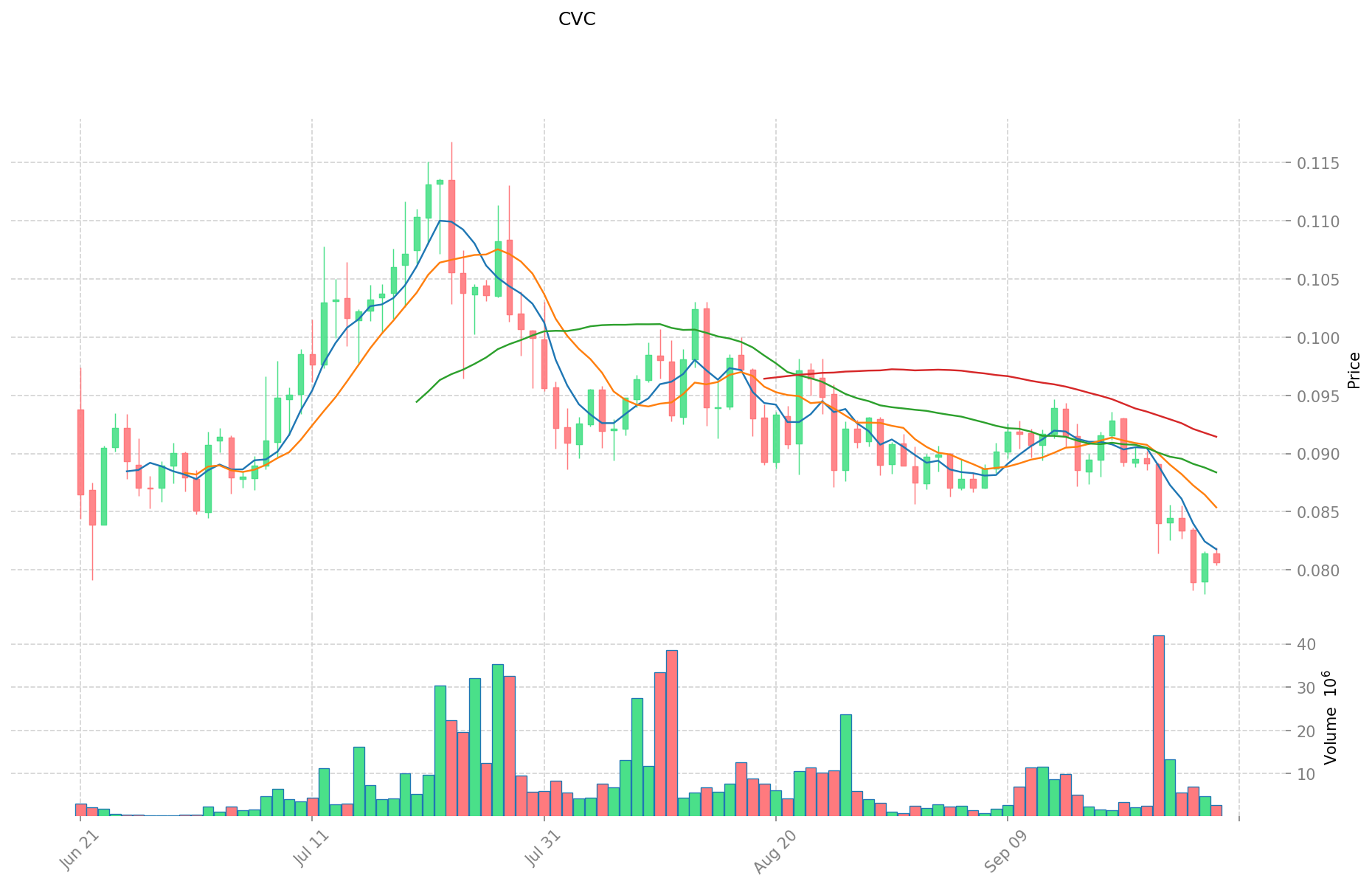什么是 CVC:深入解析企业风险投资及其在创新生态系统中的关键作用
探索 Civic (CVC),自 2017 年起一直是区块链身份验证领域的重要力量。深入了解 Civic 如何以去中心化技术革新数字身份管理,涵盖其关键里程碑、技术架构、挑战及未来前景。Civic 的定位与意义
2017 年,Vinny Lingham 和 Jonathan Smith 推出 Civic(CVC),专注于解决数字时代的身份验证与管理难题。
作为去中心化身份生态系统,Civic 在数字身份管理和安全认证领域扮演着核心角色。
截至 2025 年,Civic 已成长为区块链身份验证领域的领军者,用户规模不断扩大,开发者社区活跃。我们将深入探讨其技术架构、市场表现及未来前景。
起源与发展历程
诞生背景
Civic 于 2017 年由 Vinny Lingham 和 Jonathan Smith 创立,旨在破解数字世界中安全高效身份验证的难题。
伴随区块链技术发展,Civic 致力于让用户掌控个人数据,并提供安全、低成本的身份验证解决方案。
Civic 的推出推动了企业和个人在安全高效身份管理方面的行业变革。
重要里程碑
- 2017 年:通过代币销售筹集 3300 万美元,用于项目发展。
- 2018 年:推出 Civic 钱包,为数字身份的安全存储和管理提供便捷方式。
- 2020 年:发布 Civic Pass,增强 DeFi 及多种区块链应用的身份验证能力。
- 2022 年:拓展生态合作伙伴关系,推动跨行业应用落地。
Civic 在社区和基金会的支持下,不断推进技术、安全性及应用场景的迭代。
Civic 如何运作?
去中心化控制
Civic 依托全球分布的节点网络运行,不受银行或政府监管。
节点通过协作验证交易,保障系统透明、具备高抗攻击性,赋予用户更高自主权,增强网络韧性。
区块链核心
Civic 区块链是公开且不可篡改的数字账本,完整记录每笔交易。
所有交易按区块分组,并以密码学哈希链接形成安全的链条。
任何用户均可查阅记录,实现无需中介的信任机制。
Civic 独特的身份验证方式充分利用区块链技术,提升安全性与隐私保护。
公平性保障
Civic 采用共识机制验证交易,防止双重支付等欺诈行为。
参与者通过不同活动维护网络安全,并获得 CVC 代币奖励。
Civic 创新地实现了安全身份验证和用户自主数据共享。
安全交易
Civic 采用公私钥加密机制保障交易安全:
- 私钥(如密码)用于签名交易
- 公钥(如账号)用于验证所有权
该机制确保资金安全,交易仍具有伪匿名。
Civic 还集成生物识别和加密存储等安全措施,进一步提升系统整体安全性。
Civic(CVC)市场表现
流通概况
截至 2025 年 9 月 28 日,Civic 的流通量为 802,000,010 枚代币,总供应量为 1,000,000,000 枚。
价格波动
Civic 在 2018 年 1 月 3 日创下历史高点 $1.35,受加密货币整体牛市推动。
最低价格出现在 2020 年 3 月 13 日,为 $0.01102541,或因新冠疫情导致全球市场暴跌。
价格波动反映市场情绪、采纳动向及外部环境影响。
点击查看最新 CVC 市场价格

链上指标
因信息有限,目前暂不提供 Civic(CVC)每日交易量、活跃地址数量及质押率等链上指标。
Civic 生态应用与合作关系
核心应用场景
Civic 生态支持多类应用:
- 身份认证:通过区块链实现安全、低成本的身份验证。
- 数字身份平台:用户可建立虚拟身份并在设备上安全存储个人信息。
战略合作
Civic 通过合作伙伴关系提升技术实力与市场影响力,为生态扩展奠定基础。
争议与挑战
Civic 面临如下挑战:
- 技术难题:身份验证系统在多平台扩展的技术挑战。
- 合规风险:数据隐私与跨司法管辖区的合规要求。
- 竞争压力:来自新兴区块链身份解决方案的竞争压力。
上述问题引发社区及市场广泛讨论,推动 Civic 持续创新。
Civic 社区与社交媒体氛围
粉丝活力
Civic 社区表现活跃,对去中心化身份解决方案的兴趣持续升温。
在 X 平台,相关帖子和标签(如 #Civic)频繁登上热门榜单,反映社区高参与度。
新功能发布和合作消息不断激发社区热情。
社交媒体情绪
X 平台讨论呈现多元观点:
- 支持者高度认可 Civic 的安全性和去中心化优势,认为其代表“数字身份的未来”。
- 批评者则关注落地难点和隐私风险。
最新趋势显示,去中心化身份解决方案的关注度不断提升。
热门话题
X 用户积极探讨 Civic 在身份验证和数据隐私变革方面的潜力, 既肯定其创新价值,也关注主流采纳的挑战。
Civic 相关信息来源
- 官方网站:访问 Civic 官方网站,了解产品功能、应用场景与最新动态。
- 白皮书:Civic 白皮书详解技术架构、发展目标与愿景。
- X 平台动态:Civic 在 X 平台的账号为 @civickey,截至 2025 年 9 月 28 日拥有粉丝, 内容涵盖技术更新、社区活动及合作资讯。
Civic 未来发展规划
- 生态目标:持续扩大去中心化身份解决方案的应用范围
- 长期愿景:成为全球安全、隐私数字身份认证标准
如何参与 Civic?
- 购买渠道:可在 Gate.com 购买 Civic(CVC)
- 存储方式:使用安全钱包管理 CVC 代币
- 参与治理:通过投票机制深度参与社区决策
- 生态建设:查阅开发文档,参与 Civic 生态开发与建设
总结
Civic 以区块链技术推动数字身份变革,带来透明、安全、高效的身份认证。 活跃的社区、丰富的资源和强劲市场表现令其在加密货币领域表现突出。 尽管面临合规与落地挑战,Civic 的创新精神和清晰发展蓝图,使其成为去中心化科技未来的重要力量。 无论是行业新手还是资深从业者,Civic 都具备较高关注与参与价值。
常见问题解答
CVC 是什么?
CVC 即 Civic,是一个基于区块链的身份验证平台,通过加密货币技术提供安全、高效的身份认证服务。
银行卡上的 CVC 指什么?
CVC 是信用卡或借记卡上的 3-4 位安全码,用于验证交易真实性、预防在线欺诈。
我的 CVC 码在哪里?
您的 CVC 码通常位于信用卡背面的签名条上,是 3 位数字。
英语语法里的 CVC 是指什么?
英语语法中的 CVC 结构指辅音-元音-辅音结尾的单词,加后缀时末尾辅音通常双写。
分享
目录